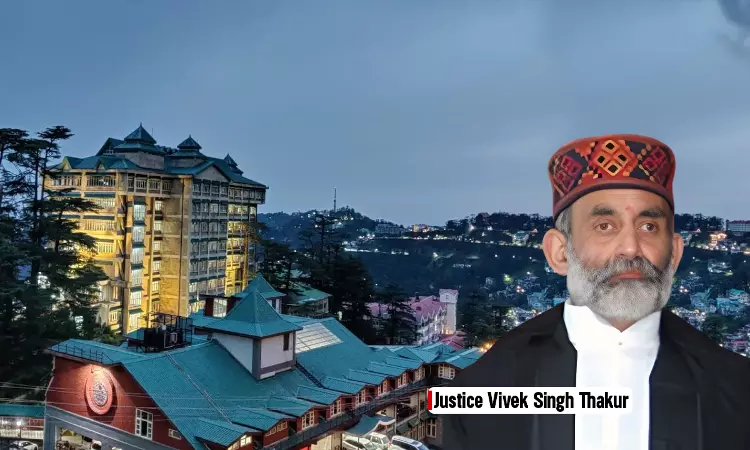- Home
- /
- High Courts
- /
- Himachal Pradesh High Court
- /
- Re-Entry Of Tenant After...
Re-Entry Of Tenant After Construction, Is Conditional And Depends On Mutual Agreement Between Parties: Himachal Pradesh High Court
Mehak Aggarwal
3 May 2025 11:09 AM IST
Himachal Pradesh High Court decided a 10-year-long tenancy dispute, holding that re-entry of a tenant into the premises after being evicted by the landlord for construction purposes, is conditional and depends on mutual agreement between the parties.Justice Vivek Singh Thakur held : Section 14(3)(c) of the Act allows a landlord to seek eviction of a tenant from the premises, if he proves...
Himachal Pradesh High Court decided a 10-year-long tenancy dispute, holding that re-entry of a tenant into the premises after being evicted by the landlord for construction purposes, is conditional and depends on mutual agreement between the parties.
Justice Vivek Singh Thakur held : Section 14(3)(c) of the Act allows a landlord to seek eviction of a tenant from the premises, if he proves a Bonafide requirement of the land being reconstructed. The tenant evicted has the right to re-entry, on the basis of mutual agreement between parties and new terms of tenancy.
Background Facts:
The landlord, in the year 2008, filed a petition before the Rent Controller authority seeking eviction of the tenant for the purpose of reconstructing the building where the tenant was residing. The landlord proved a Bonafide requirement that the eviction was necessary for the purpose of reconstruction of the building.
The petition was allowed in 2011, and the tenant was ordered to vacate the premises. The tenant subsequently filed an appeal against the eviction order before the appellate rent tribunal. Dissatisfied with the tribunal's decision, the landlord approached the high court and the decision came in his favour. Challenging, the order of the High Court the tenant filed a Special Leave petition before the Supreme Court, which was dismissed. The tenant was directed to vacate the premises by 30.06.2014.
Subsequently, the tenant filed an application before the Rent Controller Authority under Section 14(3)(c) of the Act for asking the landlord to start construction within 6 months of eviction and to permit the tenant to move back into premises within one month of completion of construction. However, the application of the tenant was dismissed by the Authority.
Aggrieved by the same, the tenant filed revision petition in High Court seeking to set aside order of the rent controller Authority.
Findings:
The High Court observed that, under Section 24(1)(b) of the H.P. Urban Rent Control Act, an appeal against an order passed by the Authority must be filed before the Appellate Rent tribunal. However, section 24(5) of the Act grants the High Court to call for and examine records of any order or proceeding under the act.
The High Court further noted that, usually, if an appeal against the order of the Authority is filed, the parties are directed to approach the Appellate Rent Tribunal. However, the court decided to hear the appeal, as 10 years had already passed since the revision petition was filed in 2014.
Therefore, the High Court noted that the right of re-entry of a tenant in the premises as per Section 14(3)(c) of the Act is not absolute and is based on a mutual agreement between the parties and the purpose of re-construction of the building by the landlord.
In the case of Rattan Chand V/s Madhu Bharat Chadha, the Supreme Court held that the right to re-entry of a tenant evicted for reconstruction purposes is conditional. The right is based on various factors, such as the landlord's purpose for re-construction, which can be converting the building from residential to commercial use, or using it for any other purpose at their discretion.
Based on the above, the court opined that there is nothing on record to proves that the premises in question have been rebuilt or that the landlord has determined the purpose of re-construction. Furthermore, there was no evidence of any mutual agreement between the landlord and the tenant regarding new terms of tenancy.
Additionally, the court also said rights of re-entry are being claimed by the son of tenant, and not by the tenant himself. The son and his family were already residing somewhere else. The court remarked that right to re-entry is for tenants who have no other alternative shelter.
The court noted that the Supreme Court had directed the tenant to handover the possession of the premises to the landlord on or before 30.06.2014. Since, the tenant had filed an application before this date, it was not maintainable as the premises had not yet been vacated.
Therefore, the Court dismissed the revision petition by the tenant.
Case Name: Roshan Lal Bhardwaj v/s Ashok Sud & another
Case No.: Civil Revision No.172 of 2014
Date of Decision: 22.04.2025
For the Petitioners : Mr.Chandernarayana Singh, Advocate.
For the Respondents: Mr. Arjun Lall and Mr.Aakash Thakur, Advocates.

